MTRON SSD 32GB: Wile E. Coyote or Road Runner?
by Gary Key on August 15, 2007 3:00 AM EST- Posted in
- Storage
PCMark05 Performance
We are utilizing the HDD test suite within PCMark05 for further comparative hard disk scores as it provides a mixture of actual application results and specific read/write percentages utilized within these programs. The program utilizes the RankDisk application within the Intel iPEAK SPT suite of tools to record a trace of disk activity during usage of real world applications. These traces are then replayed to generate performance measurements based upon the actual disk operations within each application. The HDD test suite contains 53% read and 47% write operations with each trace section utilizing varied amounts of read or write operations. Additional information about the test suite can be found in PDF format here PCMark05 whitepaper.
Our test results are based upon the following trace runs:
Windows XP Startup: This test consists of 90% reading and 10% writes that tracks XP activities at start-up.
Application Loading: This test consists of 83% reading and 17% writes that tracks the opening and closing of the following programs.
File Write: This test consists of 100% write activities by writing 680MB of files onto the hard disk.
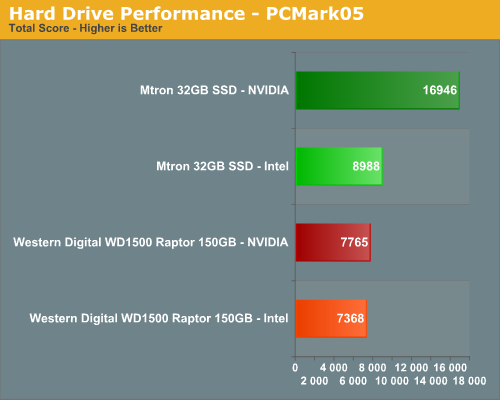
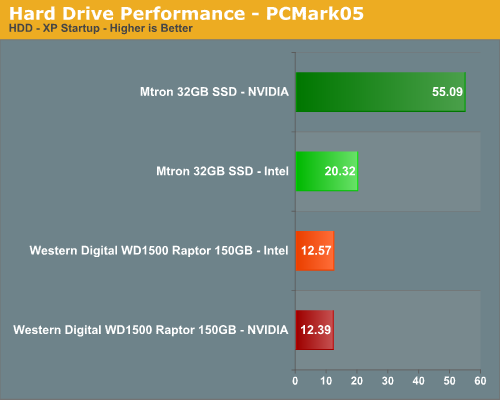
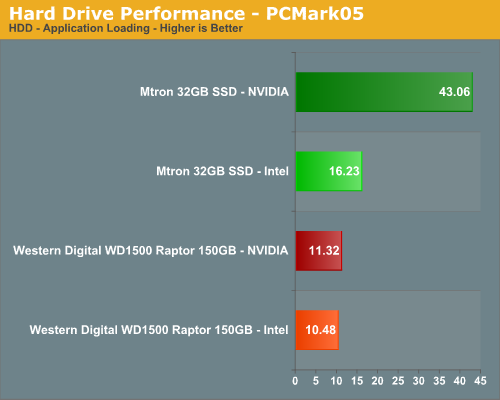
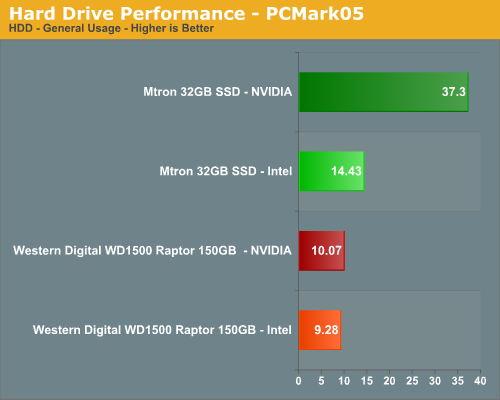
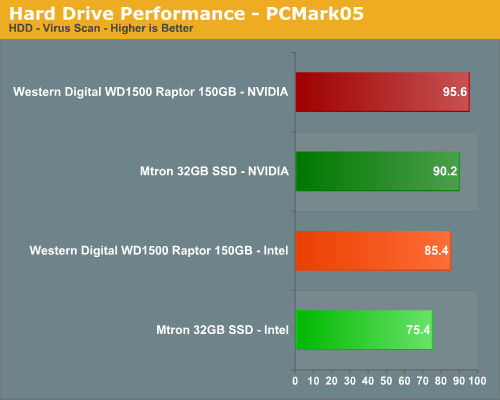
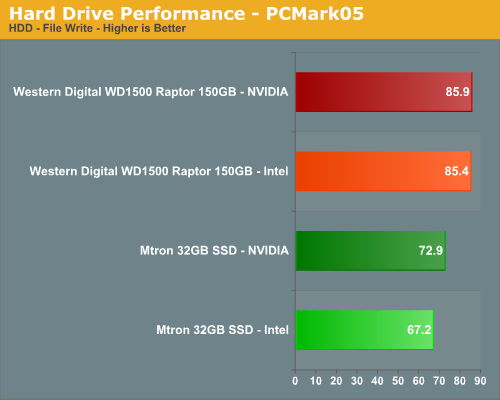
Our PCMark05 results show a new benchmark champion, and of course if you are using an NVIDIA based chipset then the resulting numbers are just that much better. Solid State Drives feature extremely low access times that are usually in the <1ms range and the first three PCMark05 test that emphasize read speeds over write speeds show the MTRON drive just walking all over the Raptor, especially with the NVIDIA chipset. While the numbers are impressive with the NVIDIA chipset, we tend to believe the Intel generated numbers are closer to actual application performance while the NVIDIA numbers are more representative of the hard drive's pure performance capability.
We fully expected the MTRON drive to score higher in the almost read only Virus scan test but it surprised us with a score slightly less than the Raptor, indicating that small block sequential file reads are not optimized on the drive at this time. We noticed the same pattern in our internal iPEAK tests where the drive scored about the same as the Raptor in the AVG virus scan and Winstone video creation tests. There is a 19% difference between the NVIDIA and Intel chipsets with the MTRON drive.
File Write tests tend to show major differences between the SSD and mechanical disks in our tests to date. The lower write speeds of the MTRON disk are in alignment with our expectations based on the drive's 80 MB/sec write speed specification. The results in PCMark05 were reproducible in our revised iPEAK test suite although we are still investigating the wide disparity between the NVIDIA and Intel controllers. However, pure hard drive performance is just one aspect of testing so let's see how the drive fares in a few application test results with both controller chipsets.
We are utilizing the HDD test suite within PCMark05 for further comparative hard disk scores as it provides a mixture of actual application results and specific read/write percentages utilized within these programs. The program utilizes the RankDisk application within the Intel iPEAK SPT suite of tools to record a trace of disk activity during usage of real world applications. These traces are then replayed to generate performance measurements based upon the actual disk operations within each application. The HDD test suite contains 53% read and 47% write operations with each trace section utilizing varied amounts of read or write operations. Additional information about the test suite can be found in PDF format here PCMark05 whitepaper.
Our test results are based upon the following trace runs:
Windows XP Startup: This test consists of 90% reading and 10% writes that tracks XP activities at start-up.
Application Loading: This test consists of 83% reading and 17% writes that tracks the opening and closing of the following programs.
- Microsoft Word
- Adobe Acrobat Reader
- Windows Media Player
- 3Dmark 2001SE
- Leadtek WinFast DVD
- Mozilla Internet Browser
- Opening a Microsoft Word document, performing grammar check, saving and closing.
- Compression and decompression using WinZip
- Encrypting and decrypting a file using PowerCrypt
- Scanning files for viruses using F-Secure Antivirus
- Playing an MP3 file with Winamp
- Playing a WAV file with Winamp
- Playing a DivX video using DivX codec and Windows Media Player
- Playing a WMV video file using Windows Media Player
- Viewing pictures using Windows Picture Viewer
- Browsing the Internet using Microsoft Internet Explorer
- Loading, playing and exiting a game with Tom Clancy's Ghost Recon
File Write: This test consists of 100% write activities by writing 680MB of files onto the hard disk.






Our PCMark05 results show a new benchmark champion, and of course if you are using an NVIDIA based chipset then the resulting numbers are just that much better. Solid State Drives feature extremely low access times that are usually in the <1ms range and the first three PCMark05 test that emphasize read speeds over write speeds show the MTRON drive just walking all over the Raptor, especially with the NVIDIA chipset. While the numbers are impressive with the NVIDIA chipset, we tend to believe the Intel generated numbers are closer to actual application performance while the NVIDIA numbers are more representative of the hard drive's pure performance capability.
We fully expected the MTRON drive to score higher in the almost read only Virus scan test but it surprised us with a score slightly less than the Raptor, indicating that small block sequential file reads are not optimized on the drive at this time. We noticed the same pattern in our internal iPEAK tests where the drive scored about the same as the Raptor in the AVG virus scan and Winstone video creation tests. There is a 19% difference between the NVIDIA and Intel chipsets with the MTRON drive.
File Write tests tend to show major differences between the SSD and mechanical disks in our tests to date. The lower write speeds of the MTRON disk are in alignment with our expectations based on the drive's 80 MB/sec write speed specification. The results in PCMark05 were reproducible in our revised iPEAK test suite although we are still investigating the wide disparity between the NVIDIA and Intel controllers. However, pure hard drive performance is just one aspect of testing so let's see how the drive fares in a few application test results with both controller chipsets.










37 Comments
View All Comments
iwodo - Wednesday, August 15, 2007 - link
With 40% price decrease per year as well as improve in transfer speed. It will only take 2-3 years before the drive become affordable.But i keep on wondering. Let say I need 10GB for OS. 10GB for Application. I still have 12GB for Swap Space and other uses. 32GB for basic usage is actually more then enough if we dont store any Music or Video.
Personally i would like to see Normal Hard Drive gets much bigger Capacity ( 2 - 4 TB Per Hard Drive ) and move them out of the Main Box to external storage via eSATA. While the Main performance Hard drive will be a SSD based Hard Drive.
wordsworm - Wednesday, August 15, 2007 - link
Boo!johnsonx - Wednesday, August 15, 2007 - link
it's a hard drive test, what difference does it make what CPU brand they use?wordsworm - Thursday, August 16, 2007 - link
Did you read the article? It mentioned how much faster it works on the Nvidia chipset than the Intel chipset. What about an AMD chipset? What difference would that make? You don't think this would make a difference after reading the article?shabby - Saturday, August 18, 2007 - link
You're right, with the amd chipset it would probably be 50% slower... good thing anandtech didnt waste their time testing on amd ;)Bladen - Wednesday, August 15, 2007 - link
Has any reputable site ever done RAID 0 tests with a pair (or more) of SSD's?AnnihilatorX - Wednesday, August 15, 2007 - link
Well http://www.tomshardware.com/2007/08/13/flash_based...">Toms Hardware had done a review including RAID 0 on SanDisk's 32GB SSDjohnsonx - Wednesday, August 15, 2007 - link
yes, but he asked for a reputable sitejohnsonx - Wednesday, August 15, 2007 - link
bad johnsonx, bad!Axbattler - Wednesday, August 15, 2007 - link
I agree that it will remain a niche market product, but I reckon that the main reason will be cost per GB. I wonder if the average consumer's space requirement has exploded much past the requirement added by Vista: how many really rip audio/video to their HD?
Granted, I am a space hog, and I happen to rip at least my CDs to lossless - but I do not know many (outside enthusiast forums) who do that. From a performance enthusiast point of view, especially those who will afford the 'best', I reckon that SSD may overtake the Raptor as the choice for OS drive within the next three years. Those users could always grab one or more TB size HD for their multimedia needs. From a silent PC enthusiast point of view, going by this review, SSD is a non brainer - the more dedicated silencers are already using 2.5" drive in their desktop.